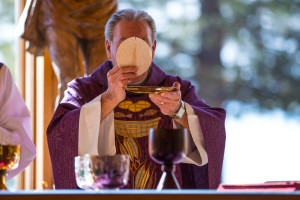If you were to ask me what sort of Catholic I was, I’d answer: moderate.
I am not such a traditionalist that I view the Extraordinary form (Latin) of the Mass as the only Mass I would ever attend, nor am I so liberal as to suggest that the liturgy of the Mass is all about the congregation.
I can appreciate the aesthetically pleasing, traditional, Latin rite, and yet I applaud the social justice work and hospitable welcome of the more liberally inclined parishes.
But one thing I abhor is liturgical politics.
Because, in my humble opinion, the time spent arguing over the merits of each, could be better spent making our Mass more reverent, more sacred.
Somewhere in amongst all of the politicking post Vatican II we, as a Church, have lost sight of what Mass, and a community of faith, is. Instead we spend much of our energies railing against Catholics who celebrate Mass differently to us.
For as long as I have been involved in ministry I have been party to each side roundly condemning the other, and trying to sway me either way. Extreme liberals are afraid that those who attend Latin Mass want to revert back to the Church pre Vatican II; and extreme traditionalists, well, that’s exactly what they want.
But generally speaking, these extremists are the exception, not the rule.
Yes, I admit that both sides have, at times, quoted Vatican II erroneously and made heretical claims about the other side’s position and often, these exaggerations have little to do with the documents quoted and rather more to do with fear.
Ten years ago now, when working in youth ministry, I sat down and read the documents from the Second Vatican Council. Yes, all of them. It was something of a slog at the time but well worth it, because what I discovered was a carefully considered document that did make some changes – but I’d argue that the ones people have the most issues with are those that were made in the ‘spirit of Vatican II’ – but still emphasised the central role and importance of the Eucharist.
A truth that is often lost in translation, or interpretation, depending on who you’re talking to.
Yes, there is something to be said for the beauty and reverence of the extraordinary form of the Mass, and it is a great blessing to be able to attend and appreciate this wealth of tradition. But it is sad that there seems to be something of an ideological elitism that accompanies these congregations which acts as something of a deterrent for those who are curious about it.
But, there is equally an ideological elitism in parishes who focus more on the social aspects of parish life, and making Mass more entertaining and participation based, at the expense of reverence and Eucharistic Adoration. I, as much as anyone, finds it hard to focus on the sacredness of Mass when the choir is off key and belting out iffy liturgical songs as though they’re the mornings entertainment.
Imagine how different our approach to Mass would be if, instead of bickering about liturgical differences, we worked together to return the sacredness to the Eucharistic sacrifice?
Imagine if, at every Mass, regardless of ideological preference, everyone was united in an utmost reverence for Our Lord; and everyone truly believed in the Real Presence.
Imagine the incredible and profound witness, of every Mass whether it is said in Latin or the vernacular, chanted or spoken, was no longer a battleground with liberal and traditional factions constantly at odds.
Imagine if all of Masses were offered the way that Jesus wanted, rather than the way that we wanted.
Imagine…heaven on earth.
Perhaps it is an unrealistic imagining on my part, but the truth remains, liturgical politicking is divisive and it doesn’t help us get to Heaven.
But the sacrifice of the Mass does.
So, perhaps it’s time to put down our liturgical swords and unite in prayer for the elusive unity of a Church united under one Shepherd, and protect the sacredness of Mass across the board.
And that’s something each of us can do, on a small, or large, scale.
Originally posted 2016-09-20 15:00:09.


Brilliant article Emily! I could’ve written this article myself as I attended the Latin mass exclusively until I was 21 and now support our local parish and being involved with both ‘sides of the fence’ I can certainly say there is a division between the two when there certainly shouldn’t be. At the end of the day I think some people forget that our own relationship with God is personal, as is the mass we attend and we’re called to attend mass and keep the 10 commandments, not get caught up in all the politics!
Thanks Nat! There are just so many other things we could be using our time for rather than wasting time debating the merits of each. We are a diverse community, but we are a community of faith first and foremost.